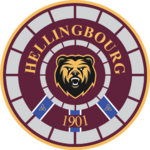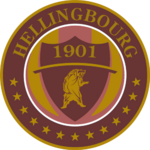FC Hellingbourg: Difference between revisions
| Line 61: | Line 61: | ||
==Badge and colours== | ==Badge and colours== | ||
[[image:Hellingbourgold.png|thumb|right|150px|Hellingbourg's crest from 1992-2015]] | [[image:Hellingbourgold.png|thumb|right|150px|Hellingbourg's crest from 1992-2015]] | ||
FC Hellingbourg took its name from the Midrasian designation for the Vaellenian city of Berghelling. At the time of the club's foundation, Hellingbourg was the official name of the city, which would only be changed in 1985, albeit with considerable opposition. The club's main colour of claret is taken from both the maroon on the Midrasian flag, but also the Claret uniforms of the loyalist army during the [[Vaellenian Rising]]. However, the shade of claret used by the club has changed slightly in recent years, incorporating a more purple shade rather than brown. | FC Hellingbourg took its name from the Midrasian designation for the Vaellenian city of Berghelling. At the time of the club's foundation, Hellingbourg was the official name of the city, which would only be changed in 1985, albeit with considerable opposition. The club's main colour of claret is taken from both the maroon on the Midrasian flag, but also the Claret uniforms of the loyalist army during the [[Vaellenian Rising]]. However, the shade of claret used by the club has changed slightly in recent years, incorporating a more purple shade rather than brown. The club has always worn a shade of claret as its home jersey, usually with white shorts. The club usually uses white or navy for the colour of their away and third kits. | ||
The club's crest has changed somewhat over the years, however has usually featured the bear emblem with which the club is associated. The previous emblem of the club also contained 13 stars which referred to the club's 13 Vaellenian regional trophies from the friendly competition which ran from 1900 to 1972. The stars were removed in the latest iteration of the logo, with many suggesting they were removed as they were constantly the butt of jokes that the club could not win any professional titles, so they displayed their informal ones instead. | |||
==Players== | ==Players== | ||
Revision as of 19:49, 28 July 2019
This article is incomplete because it is pending further input from participants, or it is a work-in-progress by one author. Please comment on this article's talk page to share your input, comments and questions. Note: To contribute to this article, you may need to seek help from the author(s) of this page. |
 | ||||
| Full name | Football Club Hellingbourg | |||
|---|---|---|---|---|
| Nickname(s) | L'Ursas (The Bears) Les Loyalistes (The Loyalists) | |||
| Short name | HEL | |||
| Founded | 9 September 1901 | |||
| Ground | Stade NorteBanque | |||
| Capacity | 40,000 | |||
| Owner | Dupey Sports Group | |||
| Chairman | Iltut Ropars | |||
| Manager | Marcus Melgaard | |||
| League | Liga Premiére | |||
| 2018–19 | Liga Premiére, 8th | |||
|
| ||||
FC Hellingbourg is a professional association football club based in Berghelling, Midrasia. The club currently competes in Liga Premiére, the highest tier of Midrasian football. Hellingbourg have only won one major trophy in their history, claiming the Copa de Mydra in 1954 after defeating FC Mydroll on penalties in the final.
Founded in 1901 by Reverend Estienne Aubert, FC Hellingbourg was set up as to counter their cross-town rivals Vaelleniana who at the time only allowed native Vaellenians to play for their team. By contrast, Hellingbourg only allowed Orthodox Alydian descendants of Midrasian settlers to play for their team. Hellingbourg spent much of their early years in Liga 2, only gaining promotion to Liga 1 in 1944. For most of their life in Liga 1 the team remained mid-table, a position they are seen to have retained to this day.
The team play their home games at the Stade Aubert which is branded the Stade NorteBanque for sponsorship reasons. The stadium has a capacity of 40,000 and is located in the south-west of the city of Berghelling. The team have a large following from the city of Berghelling and the wider Vaellenia region. Fans of the club are primarily made up of the descendants of Midrasian settlers who came to Vaellenia between the Fifteenth and Seventeenth centuries.
Fans of Hellingbourg have a long-standing rivalry with cross-town rivals Vaelleniana. Matches between the two sides are known as the Berghelling derby and in the past have been some of the most violent clashes in Midrasian football, with both sets of fans embroiled in sectarianism rooted within the makeup of each fan base. The club also has a minor rivalry with Skaer Thiaric another team from the Vaellenia region.
History
Stadium
Badge and colours
FC Hellingbourg took its name from the Midrasian designation for the Vaellenian city of Berghelling. At the time of the club's foundation, Hellingbourg was the official name of the city, which would only be changed in 1985, albeit with considerable opposition. The club's main colour of claret is taken from both the maroon on the Midrasian flag, but also the Claret uniforms of the loyalist army during the Vaellenian Rising. However, the shade of claret used by the club has changed slightly in recent years, incorporating a more purple shade rather than brown. The club has always worn a shade of claret as its home jersey, usually with white shorts. The club usually uses white or navy for the colour of their away and third kits.
The club's crest has changed somewhat over the years, however has usually featured the bear emblem with which the club is associated. The previous emblem of the club also contained 13 stars which referred to the club's 13 Vaellenian regional trophies from the friendly competition which ran from 1900 to 1972. The stars were removed in the latest iteration of the logo, with many suggesting they were removed as they were constantly the butt of jokes that the club could not win any professional titles, so they displayed their informal ones instead.
Players
Current squad
Note: Flags indicate national team as defined under international eligibility rules. Players may hold more than one nationality.
|
|
Out on loan
Note: Flags indicate national team as defined under international eligibility rules. Players may hold more than one nationality.
|
Reserve squad
Note: Flags indicate national team as defined under international eligibility rules. Players may hold more than one nationality.
|
|
